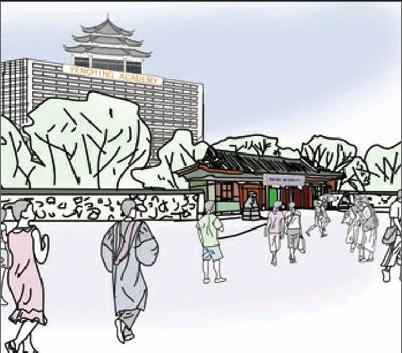How Long Does It Take to Master‘China Studies?’
2014-09-16

To recruit top scholars from China and around the world, Peking University (PKU) is set to launch yenching Academy next fall, an affiliated school that offers a masters degree in China studies. Students will be enrolled through PKUs cooperation with their colleges at home and abroad and through open recruitment. Investments have already been made to PKU, providing full scholarships to students—the first 100 of whom are expected to arrive in September next year.
yenching Academys sinology courses will include philosophy and religion, literature, culture, history and archaeology, public policies, international relations, economics, and law and society. The term of study will be one-three years for international students and two years for Chinese students. Professors will be from both PKUs host of established scholars and foreign academic institutions.
It is hoped that the launching of this program will further expand Chinas influence on global education and bring international prestige, commensurate with the nations economic expansion. However, given the universitys lofty goal—to recruit top scholars and cultivate powerful international leaders—its rather questionable whether this is a serious venture or just another way for the privileged academic elite to fluff their resumes. Many wonder: Will this highprofile masters degree program really help China in the way that is expected to?
Tu Jianmin (Hangzhou Daily): First and foremost, it sounds impossible to finish a program comprising so many courses in the span of one year. But, in my opinion, the disputes are not about whether yenching Academy should be opened or where it should be located, but rather about the transparency of this program. How can PKU operate and manage the school in a more democratic, public-oriented manner? The prestigious university has launched a very impressive program—yet it only serves 100 people. Is this just another place for the privileged? Many are rightly worried about education fairness.
As the holy land in Chinese education, Peking University has laudable goals in creating yenching Academy. However, this program, which demands a huge investment and whose goal is to “cultivate international leaders who will make a difference in the world,” appears to be more a luxury degree factory than an academy. Though the university has said it sought opinions on this topic with its students and teachers many times, doubts remain.
The most important aspects of a university are not its beautiful buildings or large campus, but its academic success and influence. PKU has already attained a sterling reputation and international prestige. Is it really necessary to set up an additional academy? Whose yenching Academy will it be?endprint
yan yu (21st Century Business Herald): There exist conflicts between many of the subjects to be offered in this degree program. According to the course list, apart from pragmatic courses, like economics and management, which aim to cultivate future leaders with a basic knowledge of China, the school will provide courses in Chinese literature, history and philosophy to spread Chinese culture. PKU excels in both its science and liberal arts programs, but the teaching and research of science and liberal arts are on different ends of the academic spectrum. Is it even possible to combine the two different disciplines in one academy? Many scholars of the arts have already pointed out that Chinese literature, history and philosophy courses combined require many years of rigorous study.
There could also be linguistic challenges facing the program. If most lessons are to be given in Chinese, then its far more difficult to recruit students than if English were used. Chinese literature, history and philosophy courses should be taught in Chinese considering vast language differences, and English is acceptable in teaching pragmatic subjects, like management. However, elite foreign students likely would not want their classes in English, just as Chinese students attending Harvard or yale do not want to be taught in Chinese. Institutes like yenching Academy are expected to provide good opportunities for foreign students to better understand the Chinese language and culture.
Tang Xiaofeng (China Youth Daily): The first session of yenching Academy plans to recruit 65 overseas students and invite 20 top international visiting professors next year. That would entail foreign professors blending into Chinese academic society and contributing to the nations intellectual development.
In modern history, many foreign scholars have come to China and made important contributions. For example, German-American geologist Amadeus William Grabau (1870-1946), who is buried at the PKU campus, fostered the growth of a group of geology scholars and made huge contributions to Chinas geological field during his more than 20 years work in the country. Presently, though, some foreign professors float outside the mainstream academic world and teach lessons with little connection to Chinese academic studies. Often, they cannot even speak Chinese.
To boost national academic research, foreign experts are expected to have more interactions with Chinese professors and bring with them new topics of research or insights. PKU should make sure that the professors it recruits have strong abilities in regard to representing Chinese academia. It should not allow mediocre professors to take advantage of their affiliation with PKU simply to burnish their images.endprint

Cheng Fangping (China Education Daily): As both a university professor and an onlooker to this debate, I think PKUs establishment of yenching Academy represents its innovation and commitment to leading in education. As the national center of Chinese studies and research, the university boasts a large number of professors and scholars in many related areas and should play a leading role in guiding the study of China both at home and abroad. Indeed, PKU has already attempted to break institutional obstacles.
However, PKU administrators initially failed to give teachers and students their say in the decision-making process, giving rise to disputes over a number of issues such as locating the academy at a cultural heritage site, mastering Chinese studies in just one year and giving lessons on Chinese culture in English. Fortunately, they later took an active response to the facultys and students opposition and allowed them to voice their opinions on the program. Based on in-depth discussions, PKU adjusted the program by changing the location of the academy, adopting a flexible schedule of study for international students, and deciding to use both English and Chinese as teaching languages.
The disputes regarding PKU have raised public attention to the management and decision-making norms at universities. University administrators should take into consideration teachers and students opinions when making choices that affect the school, rather than holding the perception that anything can be done with adequate funding. They should bear in mind that teachers and students are the main driving force behind a schools success and reform needs support from the academic public.
At a time when reform and development remain the most important missions for Chinese universities, a rational and democratic decision-making process is crucial. It represents respect for teachers and students and exemplifies the erudition of a contemporary university.endprint
